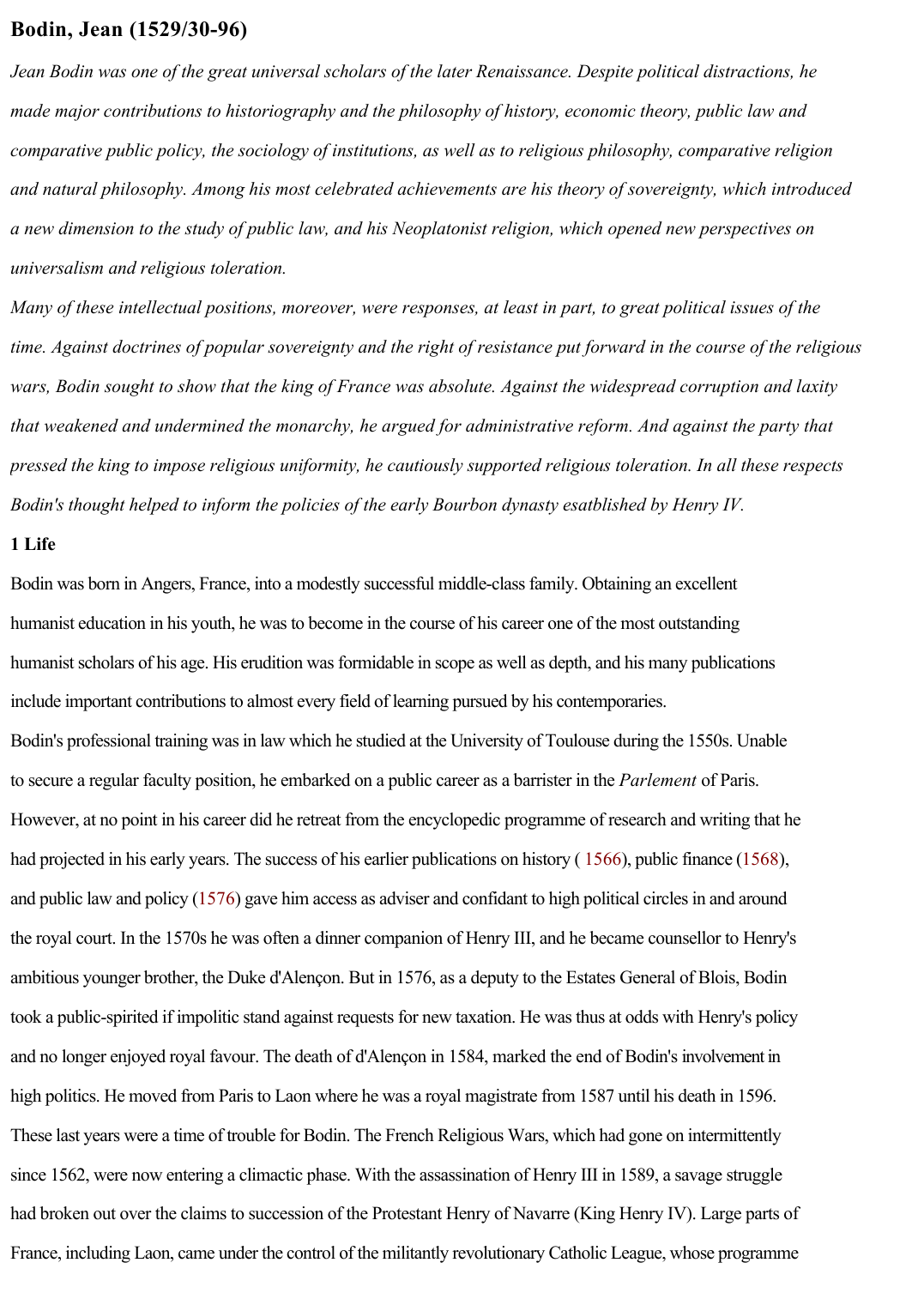Bodin, Jean
Publié le 16/05/2020

Extrait du document
«
Bodin, Jean (1529/30-96)
Jean Bodin was one of the great universal scholars of the later Renaissance.
Despite political distractions, he
made major contributions to historiography and the philosophy of history, economic theory, public law and
comparative public policy, the sociology of institutions, as well as to religious philosophy, comparative religion
and natural philosophy.
Among his most celebrated achievements are his theory of sovereignty, which introduced
a new dimension to the study of public law, and his Neoplatonist religion, which opened new perspectives on
universalism and religious toleration.
Many of these intellectual positions, moreover, were responses, at least in part, to great political issues of the
time.
Against doctrines of popular sovereignty and the right of resistance put forward in the course of the religious
wars, Bodin sought to show that the king of France was absolute.
Against the widespread corruption and laxity
that weakened and undermined the monarchy, he argued for administrative reform.
And against the party that
pressed the king to impose religious uniformity, he cautiously supported religious toleration.
In all these respects
Bodin's thought helped to inform the policies of the early Bourbon dynasty esatblished by Henry IV.
1 Life
Bodin was born in Angers, France, into a modestly successful middle-class family.
Obtaining an excellent
humanist education in his youth, he was to become in the course of his career one of the most outstanding
humanist scholars of his age.
His erudition was formidable in scope as well as depth, and his many publications
include important contributions to almost every field of learning pursued by his contemporaries.
Bodin's professional training was in law which he studied at the University of Toulouse during the 1550s.
Unable
to secure a regular faculty position, he embarked on a public career as a barrister in the Parlement of Paris.
However, at no point in his career did he retreat from the encyclopedic programme of research and writing that he
had projected in his early years.
The success of his earlier publications on history ( 1566 ), public finance ( 1568 ),
and public law and policy ( 1576 ) gave him access as adviser and confidant to high political circles in and around
the royal court.
In the 1570s he was often a dinner companion of Henry III, and he became counsellor to Henry's
ambitious younger brother, the Duke d'Alençon .
But in 1576, as a deputy to the Estates General of Blois, Bodin
took a public-spirited if impolitic stand against requests for new taxation.
He was thus at odds with Henry's policy
and no longer enjoyed royal favour.
The death of d'Alençon in 1584, marked the end of Bodin's involvement in
high politics.
He moved from Paris to Laon where he was a royal magistrate from 1587 until his death in 1596.
These last years were a time of trouble for Bodin.
The French Religious Wars, which had gone on intermittently
since 1562, were now entering a climactic phase.
With the assassination of Henry III in 1589, a savage struggle
had broken out over the claims to succession of the Protestant Henry of Navarre (King Henry IV).
Large parts of
France, including Laon, came under the control of the militantly revolutionary Catholic League, whose programme.
»
↓↓↓ APERÇU DU DOCUMENT ↓↓↓
Liens utiles
- Bodin Jean, 1530-1596, né à Angers (Maine-et-Loire), légiste et économistefrançais.
- Commentaire Jean Bodin
- Bodin, Jean Gournay, Marie Le Jars de La Boétie, Etienne de
- BODIN, Jean (1530-1596)Ecrivain politique et économiste, il est l'auteur du traité De la République.
- jean BODIN


